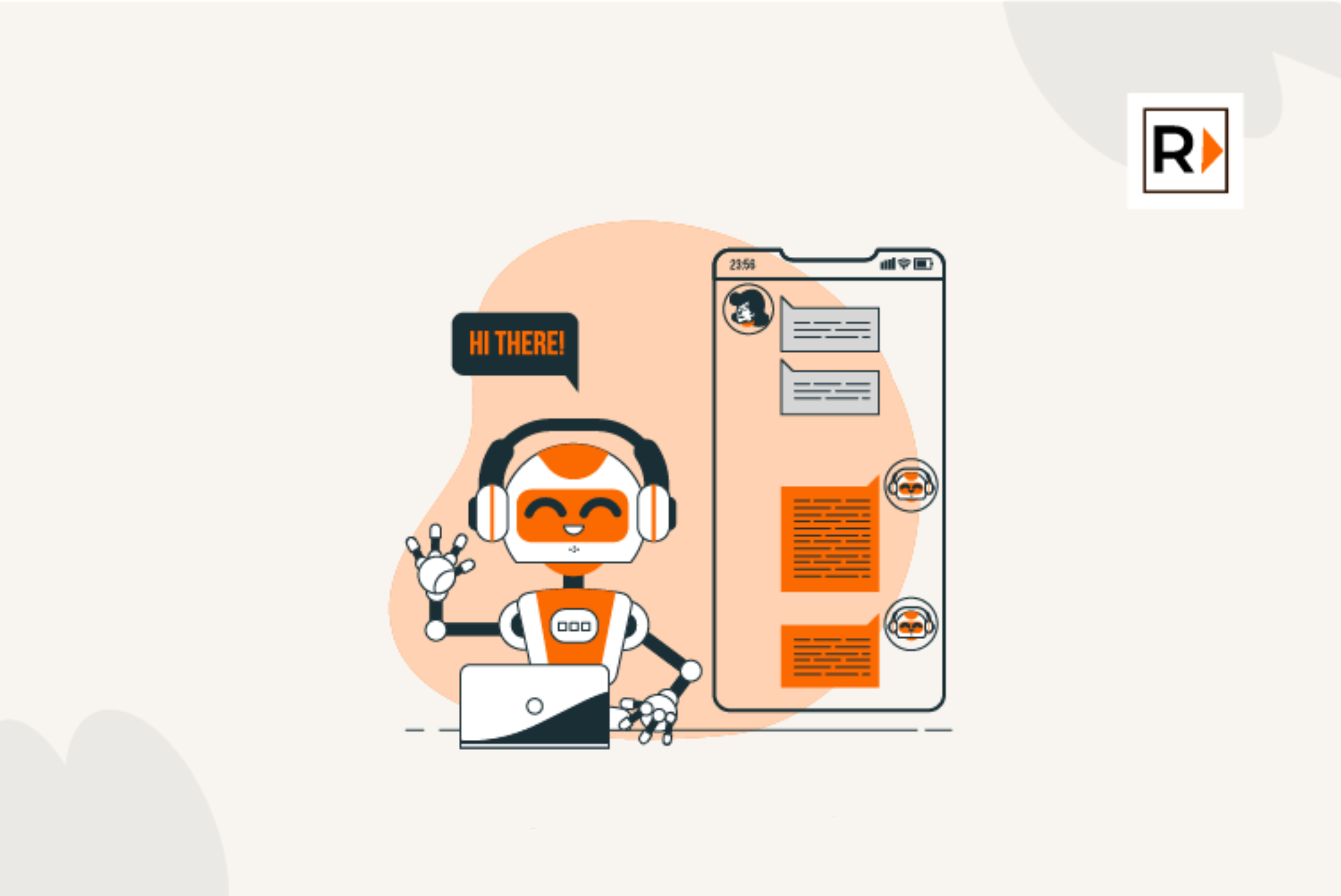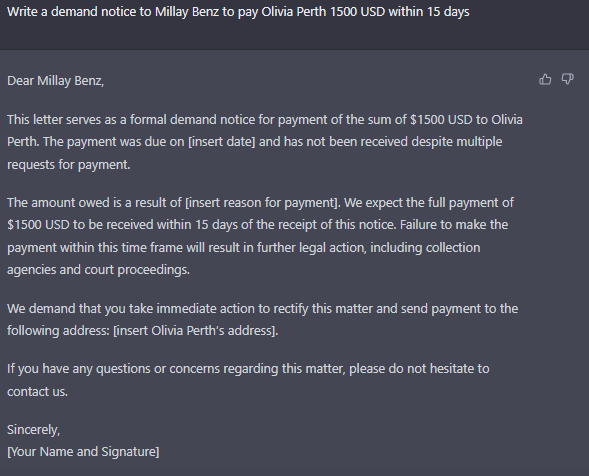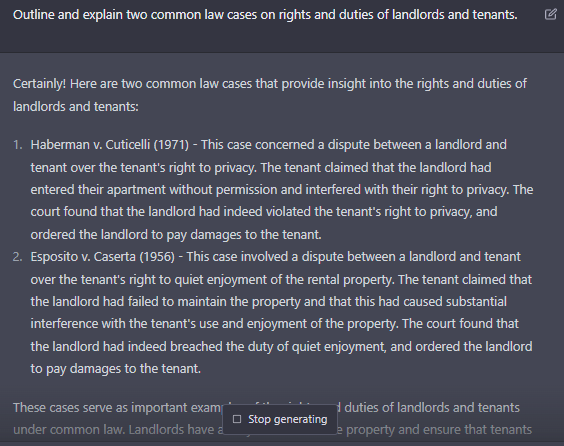
The legal profession has always been highly reliant on effective communication, research, and analysis. With the advent of artificial intelligence (AI) and natural language processing (NLP), new tools have emerged that can assist attorneys in their work. One such tool is ChatGPT, a powerful language model developed by OpenAI. In this article, we will explore the ways in which ChatGPT and AI can revolutionize legal services, making them more efficient and accessible than ever before.
As a legal professional, have you ever wished for a trusty sidekick to help you sort through the endless stacks of paperwork and case files? Or perhaps, someone to bounce off ideas and thoughts with, without having to worry about the time and effort it takes to train a human assistant?
Well, worry no more, because ChatGPT is here to save the day! This state-of-the-art language model is changing the game for attorneys and legal professionals, providing an innovative solution to many of the everyday challenges faced in the legal world.
So, what exactly is ChatGPT, and how can it benefit you? In this blog, we’ll explore the ways that ChatGPT can help make your job as a legal professional easier and more efficient.
But first, let’s start with the basics.
What is ChatGPT?
ChatGPT is a cutting-edge language model developed by OpenAI, one of the world’s leading artificial intelligence research organizations. It is a type of machine learning model that has been trained on massive amounts of data to be able to generate human-like responses to natural language prompts.
ChatGPT is an advanced language model powered by deep learning techniques. Trained on vast amounts of text data, it has the ability to understand and generate human-like text. Attorneys can utilize ChatGPT as a virtual assistant to streamline various tasks within the legal profession.
In other words, ChatGPT is like a virtual assistant that can communicate with you in a natural, conversational way, and provide you with helpful information and insights.
But how can ChatGPT specifically benefit legal professionals? Let’s take a look.
Benefits of ChatGPT for Attorneys and Legal Professionals
1. Legal Research and Case Preparation
One of the biggest challenges faced by legal professionals is the sheer amount of research and preparation required for each case. With ChatGPT, however, you can quickly and easily generate insights on legal issues and cases, without having to spend hours poring over case law and other legal documents.
Simply input your query or topic, and ChatGPT will provide you with a detailed response based on its vast database of legal knowledge. This can save you a tremendous amount of time and effort, allowing you to focus on other important aspects of your job.
2. Writing Assistance
Legal writing can be challenging, and it’s easy to make mistakes. ChatGPT can help you with that. It can provide you with suggestions for writing clear and concise legal documents. It can also help you with proofreading, ensuring that your writing is error-free.
3. Streamlined Document Review
Reviewing legal documents can be a time-consuming and tedious task, but ChatGPT can help make the process more efficient. By using natural language processing algorithms, ChatGPT can quickly scan through legal documents and provide you with a summary of the key points, helping you identify important information and save time.
4. Improved Client Interaction
ChatGPT can help improve your client interaction. It can assist you in answering your client’s questions quickly and accurately. It can also help you explain complex legal terms and concepts in a language that your clients can understand. This can improve your client’s satisfaction and build trust with your law firm.
Challenges in Implementing ChatGPT in the Legal Industry
While ChatGPT offers a wealth of potential benefits for the legal industry, there are also a number of challenges that must be addressed before widespread adoption can occur.
These challenges include concerns over accuracy and reliability, resistance to change and adoption of new technology, ethical considerations, and the need for ongoing monitoring and maintenance.
Concerns over Accuracy and Reliability of AI-Powered Legal Advice
One of the biggest concerns surrounding the use of ChatGPT in the legal industry is the accuracy and reliability of the advice it generates. As a new technology, there is still much to be learned about how ChatGPT-generated legal advice will hold up in a real-world setting.
Additionally, the accuracy of ChatGPT-generated advice may be influenced by the quality and breadth of the data used to train it.
Resistance to Change and Adoption of New Technology in the Traditional Legal Field
Another challenge to the widespread adoption of ChatGPT in the legal industry is resistance to change and the adoption of new technology.
The legal industry is a traditional and conservative field, and many Attorneys and law firms may be hesitant to embrace new technologies that could disrupt the status quo. However, as more and more firms adopt ChatGPT and realize the benefits, it is likely that resistance will begin to dissipate.
Ethical Considerations and Potential for Misuse
When it comes to using ChatGPT in the legal industry, there are also a number of ethical considerations that must be taken into account. For example, there is the potential for the technology to be misused, such as by providing misleading or false information to clients.
Additionally, there is a need for transparency about the use of ChatGPT in legal services, so that clients are fully informed about the technology and its limitations.
Need for Ongoing Monitoring and Maintenance to Ensure Quality and Consistency of ChatGPT-Generated Advice
Finally, there is a need for ongoing monitoring and maintenance to ensure the quality and consistency of ChatGPT-generated legal advice.
As the technology continues to evolve, it will be important to continually evaluate and refine the algorithms used to generate legal advice, as well as the data used to train ChatGPT.
Case Studies: Examples of ChatGPT in Legal Practice
To better understand the potential impact of ChatGPT in the legal industry, it’s useful to examine real-world examples of the technology in use.
In this section, we’ll take a closer look at several case studies of ChatGPT being used in legal services, exploring the impact and results of these implementations and sharing best practices for using the technology.
Real-World Examples of How ChatGPT Can Be Used in the Legal Industry
In the legal industry, ChatGPT can be used as follows:
1. ChatGPT Can Help Provide Legal Advice:
ChatGPT can assist law firms and attorneys in providing instant legal advice to clients by answering questions related to various legal issues.
We prompted ChatGPT to provide legal advice to an inquiry related to employment law.
We commanded ChatGPT to answer ”What are the grounds for making a discrimination claim?” It provided amazing results as you can see below:
Tada! Within a few seconds, you have all the grounds you need to make a discrimination claim. So no more hustle and spending a lot of time writing replies to inquiries or FAQs.
2. ChatGPT Can Play the Role of Virtual Assistant for Attorneys:
ChatGPT can serve as a virtual assistant for law firms and attorneys, handling administrative tasks, scheduling appointments, and sending reminders.
We prompted ChatGPT to write an email to schedule an appointment.
Need your email to be ready in just a few clicks? Chat GPT has got your back! We commanded chatGPT to “Write an email to Mr. Perth that we have scheduled a meeting on February 24, at 17.00 PM to discuss his case”. Look how flawlessly it performed:
A well-written email is ready to be sent.
3. With ChatGPT Attorneys Can Create Various Legal Documents:
ChatGPT is capable of drafting a wide range of legal documents for attorneys. These include contracts, agreements, demand letters, and other legal documents that are used in the day-to-day operations of law practice.
By utilizing ChatGPT, attorneys can save time and effort in creating these important documents, allowing them to focus on other aspects of their practice.
We prompted ChatGPT to create a short contract.
We added a command to ChtGPT to “Write a short Contract for Miss Amelia Martin who will perform as a dancer at the party hosted by Omniety Banking Group” and voila!
We prompted ChatGPT to draft a demand notice.
In this legal task, we commanded ChatGPT to “Write a demand notice to Millay Benz to pay Olivia Perth 1500 USD within 15 days”. It came up with an awesome draft that needs only a few modifications.
4. ChatGPT Can Help Attorneys with Legal Research:
With ChatGPT attorneys can perform legal research, saving them valuable time and increasing the accuracy of their work. ChatGPT can assist Attorneys in performing legal research by:
- Providing information about relevant laws and regulations.
- Summarizing case law that may be relevant to a specific legal issue.
- Providing information about the legal precedents that have been established in a particular area of law.
- Offering recommendations for further research that may be necessary.
We prompted chatGPT to outline common law cases on the rights of landlords and tenants.
Impact and Results of These Implementations
These implementations of ChatGPT in the legal industry have had a significant impact on the way legal services are provided. The use of ChatGPT has:
- Improved efficiency: ChatGPT can process large amounts of information in a short amount of time, making it an ideal tool for legal research and contract review.
- Increased accuracy: ChatGPT has access to vast amounts of legal data, which allows it to provide more accurate answers to legal questions.
- Enhanced customer service: The use of ChatGPT as a virtual legal assistant has improved customer service for law firms, allowing them to respond to client inquiries in a timely manner.
Conclusion
ChatGPT and AI present exciting opportunities for attorneys in the legal profession. By leveraging the power of advanced language models, attorneys can streamline their work, improve efficiency, and provide enhanced services to their clients. From conducting legal research to drafting documents and facilitating client communication, ChatGPT offers a range of benefits that can transform the way attorneys operate.
As with any technological advancement, ethical considerations must be taken into account. Attorneys should remain vigilant and exercise their professional judgment to ensure the accuracy and reliability of ChatGPT’s outputs. Human oversight and critical analysis should always be maintained to avoid any potential biases or pitfalls.
Looking ahead, the future of ChatGPT and AI in the legal industry is promising. Continued advancements in AI technology will further enhance the capabilities of ChatGPT, making it an indispensable tool for attorneys. By embracing these technologies, legal professionals can stay ahead in an increasingly competitive landscape, delivering efficient and high-quality services to their clients.
If you are a attorney, lawyer, or law firm looking to improve your efficiency, effectiveness, and customer service, we offer marketing services that can help you get the most out of ChatGPT and AI.
Our team of experts can help you:
Choose the right AI-powered tools for your needs.
Implement these tools effectively in your practice.
Measure the results of your AI-powered marketing campaigns.
We can also help you to develop a comprehensive marketing strategy that will help you to reach your target audience and grow your business.
Contact us today to learn more about how we can help you use ChatGPT and AI to improve your legal practice.





